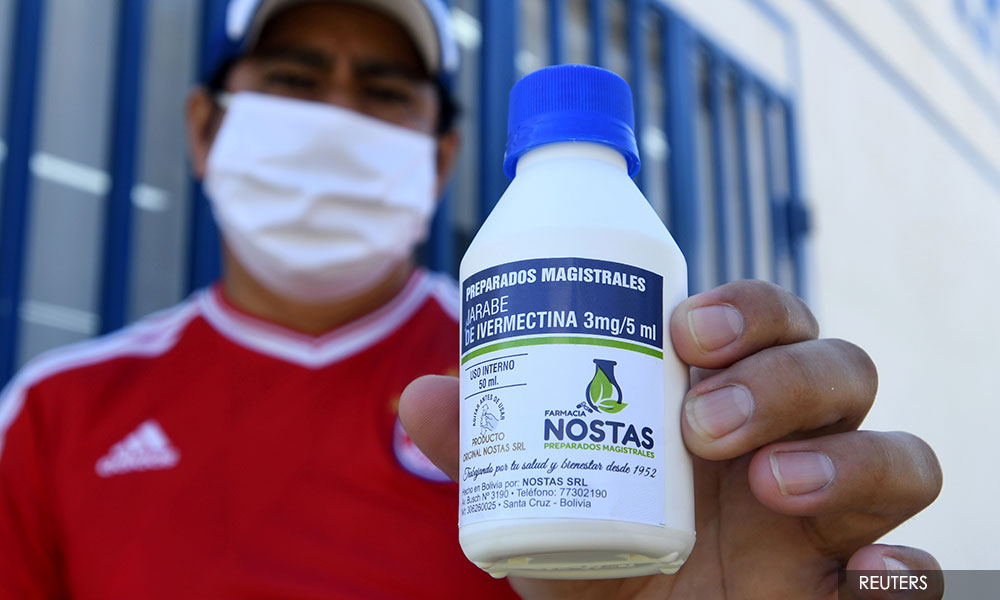In response to unproven claims regarding the use of Ivermectin as a preventive drug for Covid-19, the Health Ministry has announced plans to carry out randomised clinical trials to see if the drug can be used.
"The Health Ministry (MOH) Malaysia has initiated a randomised clinical trial to repurpose Ivermectin and evaluate its efficacy and safety in high-risk Covid-19 patients.
"The trial will enrol 500 Covid-19 patients admitted to 12 MOH hospitals. Through this study, MOH hopes to have a correct perspective on the clinical effectiveness of Ivermectin," said Health Ministry director-general Dr Noor Hisham Abdullah (above) in a post today.
Ivermectin is an anti-parasitic drug mostly used in veterinary medicine, especially in treating worm infestations.
"In April 2020, researchers using laboratory methods showed that Ivermectin can also inhibit the replication of SARS-CoV-2, the novel virus that causes Covid-19 illness," he said.
He refers to a laboratory study that used such high doses of Ivermectin that is implausible in a living being.
"Since then, many authors relying on findings from small studies and case series have suggested the potential use of Ivermectin against Covid-19. Yet the recommendation for the ‘off-label’ use of Ivermectin in Covid-19 has been controversial since the beginning," he continues.
Limited studies, inconclusive trials
Noor Hisham added that although Malaysia’s risk for Covid-19 transmission may be heightened at the moment, we must keep in mind that in all circumstances, we need to take steps necessary to figure out what really works.
"Without the benefit of evidence from well-designed clinical trials, the MOH is not yet able to endorse Ivermectin to prevent or treat Covid-19 illness. Science remains the best weapon against the SARS-CoV-2 virus, not circumstantial hype," he said.

He said many of the cited Ivermectin studies had limitations including small sample sizes, non-controlled study designs, or that the drug was used as add-on treatment.
"Therefore this had confounded the effect of Ivermectin, if any. In January 2021, a placebo-controlled randomised trial involving 24 non-severe Covid-19 patients did not manage to show a reduction in the proportion of PCR positive patients on day seven, post-Ivermectin 400 mcg/kg single oral dose treatment.
"The authors of the pilot study, published in EClinical Medicine (Lancet), opinionated that larger trials may be needed to understand the effects of Ivermectin. In March this year, the Journal of American Medical Association (Jama) published a randomised-controlled trial involving 476 adults with mild Covid-19 disease given a five-day course of Ivermectin.
"The results showed there was no significant improvement in Covid-19 symptoms resolution time. Whilst Ivermectin may have some anti-viral and anti-inflammatory effects, the evidence remains inconclusive," he pointed out.
NGOs tout Ivermectin as 'miracle', regulators disagree
Regulatory bodies including the US FDA and the European EMA, after evaluating these studies, have concluded there was insufficient evidence to support the use of Ivermectin as treatment of Covid-19.
The World Health Organisation (WHO) also issued guidelines against the routine use of Ivermectin in the treatment of Covid-19 except in clinical trial settings.
Noor Hisham said regardless of these decisions, support for Ivermectin as a “miracle drug” is being circulated by several NGOs and by those who want the drug repurposed against Covid-19.
"Recently, the Coalition on Integrity of Vaccines & Drugs Against Covid-19 (Civdac) Malaysia, surmised that no one would die from Covid-19 if only Ivermectin is given from the onset of one’s illness.
"Specifically, the Civdac cites scientific proof on the utility of Ivermectin as recommended by some experts from US-based Front Line Covid-19 Critical Care (FLCCC).
"Yet, the synthesis of the evidence includes inferences only from preliminary reports of work without peer review and opaqueness for risk of bias assessment of studies included in the body of evidence," he said.
For the record, a "living" systematic review published in the British Medical Journal found that Ivermectin made no difference for patients in terms of:
- Reducing the need for mechanical ventilation
- Reducing adverse events
- Achieving viral clearance in seven days, or reducing overall time to viral clearance
- Reducing the length of hospital stay
- Reducing the time it takes to recover from symptoms
- Reducing hospital admission rates
When it comes to reducing the death rate, the available evidence for Ivermectin is deemed "very uncertain" due to poor quality of the studies.
A systematic review entails an exhaustive search of all relevant studies and summarising its findings in accordance with a pre-determined protocol. This minimises the risk of bias and plays a key role in informing evidence-based medicine.
The systematic review published in the BMJ is updated regularly, and the last update was performed on April 6. - Mkini



No comments:
Post a Comment
Note: Only a member of this blog may post a comment.